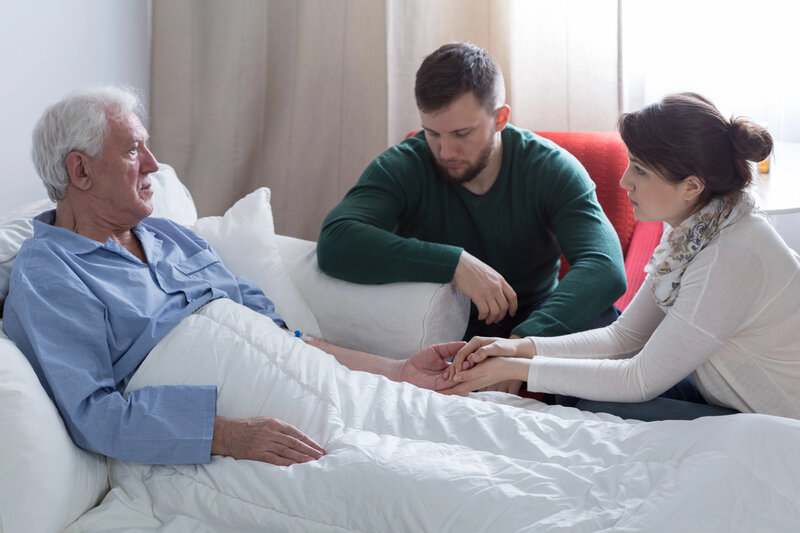Who Are The Members Of Your Death Care Community?

Most people don’t know about or haven’t considered the concept of a death care community. Or, if they think about the end of their life, they make assumptions about who would care for them or make decisions for them if and when they can’t do that for themselves.
Quality End-Of-Life Care: Establishing A Death Care Community
However, all too often, the ones we assume will take care of us aren’t able to when the time comes. Or, your spouse’s or children’s ideas about what’s needed for your end-of-life care may differ from yours – especially if you don’t have a clear advanced care directive or end-of-life care plans. As longtime hospice care providers, we feel people should take the time to deeply consider who the best choices are for being part of their personal death care community.What Is A Death Care Community?
In hospice services, we take a broad spectrum approach to end-of-life care, including clinical and non-clinical professionals who honor our clients’ physical, mental, emotional, and spiritual well-being. We encourage clients and the public to take a similarly comprehensive approach when creating a death care community, which doesn’t need to be more than two or three others—but can be more. Examples include:- People who are comfortable talking about, facing, and working through end-of-life issues with you.
- Professionals/clinical people who are familiar with your medical history understand and care about your values and commit to supporting your end-of-life wishes.
- People you trust to honor your advanced care directive and end-of-life plans (even if those closest to you are asking for something different).
- Those willing to help manage things around the house or wherever you choose to die.
- People who can calmly and confidently hold your wishes as “law” if others are pushing for their own agenda and when you can no longer do so.
- Provide support for your immediate circle of family and loved ones.
People comfortable with end-of-life topics and emotions
First and foremost, your death care community consists of individuals who can talk to you openly about end-of-life issues. Our culture is getting better about this, but it’s primarily been a “death avoidant” and even “death phobic.” People will go to great lengths to stay alive despite the pain, suffering, or depleted quality of life that may entail. Your end-of-life care community honors that death is as sacred and meaningful as birth, and they are wholly devoted to honoring your end-of-life wishes, even if they differ from their own. These are the people who will:- Ensure you don’t receive treatments or life support options you don’t want.
- Hold the boundaries for who can be present and when during your last months/weeks/days based on your written wishes.
- Provide respite care for spouse/family caregivers so they can nourish themselves and take care of their needs, especially during those last weeks/days.
- Provide the “heavy lifting” of your end-of-life care so your spouse and family can be present with you and not distracted by the “business” of dying.
- Helps orchestrate meals, housekeeping, errand running, etc., as needed.
- Honor and participate in your vigil and after-death care plans.
- And so on.
Professional or clinical support
These days, it’s increasingly common for end-of-life care to come from hospice care providers, but sometimes, it winds up being hospital personnel in clinical settings. This is a shame for the 70% or more of all people who say they’d prefer to die at home, surrounded by the people (and pets) they love. However, in most cases, you do need some type of professional or clinical support to help you comfortably die at home. While we always advocate having a hospice team in place who are happy to work with others in your death care community, you may also want to look into things like Death Doulas, who are a wonderful bridge between you, your loved ones, and your healthcare team.Those who will continue to uphold your end-of-life plans
Your end-of-life plans may not rest well with those who love you the most, especially if they become afraid, feel you are suffering, or respond in a knee-jerk way during a medical episode. This tendency for people to call 911 or wave off their loved one’s wishes to do what they feel is best can lead to you dying in places and ways you didn’t want to. Finding even a single person or two (your hospice and/or death doula are also helpful for this) who are committed to honoring your wishes and reminding others of them when things get tough is essential.Someone(s) to keep the household running
All sense of time and scheduling can run amok during the last months of a person’s life, especially when they are actively dying. Your death care community can include friends, neighbors, church members, etc., who enjoy bringing in support for others. We utilize an incredible team of community volunteers in the hospice world. Your death care community can do the same thing, including things like:- Respite care for primary caregivers.
- Grocery shopping.
- Pet walking.
- Companionship (Reading, playing games, listening to music together, etc.).
- Light housekeeping.
- Plant watering or light gardening.